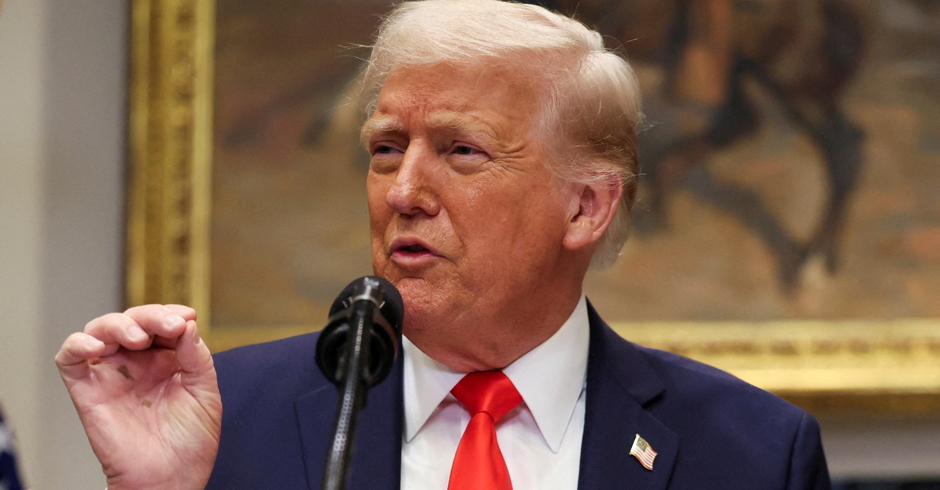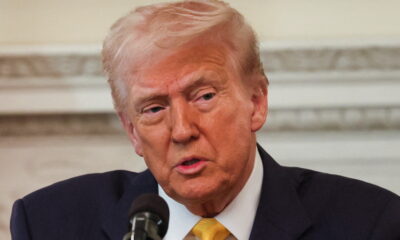In the week since Donald Trump and JD Vance launched a two-on-one televised attack on Ukrainian President Volodymyr Zelenskyy, the American president, his administration, and his allies have escalated actions that undermine—and even endanger—Ukraine and its people on multiple fronts, leading critics to denounced President Trump’s “betrayal.”
Trump and his administration reportedly will be targeting Ukrainian refugees in the U.S., and have already crippled a key military tool vital to Ukraine’s defense, halted weapons shipments, and ordered a top Pentagon agency to suspend operations and planning against Russia’s cyber offensives. Trump’s close allies reportedly are looking to back Zelenskyy’s political opponents in Ukraine. Critics—and even Russian state propagandists—say these moves send an unmistakable signal to the world: the United States has “switched sides” in Vladimir Putin’s illegal war against Ukraine.
“The new administration is rapidly changing all foreign policy configurations,” Kremlin spokesman Dmitry Peskov recently declared, as MSNBC reported Tuesday. “This largely aligns with our vision.”
President Trump “was asked for his reaction after the Kremlin said the White House was largely aligned with Moscow. He didn’t answer — but he didn’t have to,” observed MSNBC’s Steve Benen.
Reuters is reporting that the Trump administration will move to revoke the legal protected status of 240,000 Ukrainians who fled the Russian invasion to come to the United States. These refugees, under a Biden administration program, were required to pay fees, be fully vetted, and have proof of a sponsor and financial means.
READ MORE: ‘Darkness’: Buttigieg Warns on Trump, SCOTUS, and Democracy
“The move, expected as soon as April, would be a stunning reversal of the welcome Ukrainians received under President Joe Biden’s administration,” according to Reuters, which noted that at least some could be put on a fast track to deportation.
While Reuters reports its sources say the plan was in place before President Donald Trump’s and Vice President. JD Vance’s Oval Office blowup, it also comes amid moves that appear to put the Trump administration on the side of Russia and President Vladimir Putin.
Earlier this week, President Trump ordered a suspension of critical intelligence sharing with Ukraine, a move that is “expected to cripple Kyiv’s ability to target Russian forces,” The Wall Street Journal reported.
The Trump administration also “suspended weapons shipments to Ukraine earlier this week,” after the “contentious Oval Office meeting with Ukrainian President Volodymyr Zelensky,” the Journal reported. Central Intelligence Agency Director John Ratcliffe, “said Trump, after that meeting, had also ‘asked for a pause’ of intelligence sharing.”
For years, the CIA and other U.S. Intelligence agencies “have forged deep ties with Ukrainian counterparts,” according to the Journal. Now, that has changed.
“We have taken a step back and are pausing and reviewing all aspects of this relationship,” Trump National Security Advisor Mike Waltz told reporters Wednesday.
Trump’s decision to halt intelligence sharing “will cost civilian lives almost immediately, dismayed Ukrainians said Thursday,” NBC News reported. The President’s decision also came as European leaders, including Ukrainian President Volodymyr Zelenskyy, “convened a summit in Brussels as they attempt to cope with an upended landscape in which the Trump administration appears to be treating them with hostility while seemingly warming to the Kremlin.”
In another escalation against Ukraine and an apparent move toward Russia, on Wednesday, U.S. Secretary of State Marco Rubio told Fox News that the war in Ukraine is “a proxy war between nuclear powers – the United States, helping Ukraine, and Russia – and it needs to come to an end.”
Reuters reported that the Kremlin “said on Thursday that U.S. Secretary of State Marco Rubio’s view that the Ukraine conflict is a proxy war between the United States and Russia is in line with Russian President Vladimir Putin’s own assessment.”
READ MORE: ‘Betrayal’: Democrats Blast Trump’s ‘Assault’ on VA Over Plan to Cut 80,000 Employees
On Thursday, Politico Europe exclusively reported that “senior members of Donald Trump’s entourage have held secret discussions with some of Kyiv’s top political opponents to Volodymyr Zelenskyy, just as Washington aligns with Moscow in seeking to lever the Ukrainian president out of his job.”
“The discussions centered on whether Ukraine could hold quick presidential elections. These are being delayed in line with the country’s constitution because Ukraine remains under martial law. Critics of holding elections say they could be chaotic and play into Russia’s hands, with so many potential voters serving on the front lines or living abroad as refugees.”
Politico notes that while the Trump administration denies interfering in Ukraine’s domestic politics, “the behavior of Trump and his officials suggests quite the opposite. Trump has accused Zelenskyy of being a ‘dictator without elections,’ and hinted he would not be ‘around very long’ if he didn’t do a deal with Russia. Director of National Intelligence Tulsi Gabbard has falsely accused Kyiv of canceling the election.”
University of Copenhagen award-winning professor of political science, Marlene Wind, blasted the news.
“This is just appalling. Is Trump secretly planning a coup in Kyiv by replacing @ZelenskyyUa with a pro-Russian politician?” she asked.
Bartłomiej Gajos, a historian of Russia and the Soviet Union, asked: “Is it official US policy to seek regime change in Ukraine? That would be my question to the administration if I were a journalist.”
Meanwhile, critics are also condemning Secretary Rubio’s remarks—with some calling them Russian talking points. And President Trump’s decision to target the nearly quarter-million Ukrainian refugees in the U.S. is also being denounced.
Critics Sound the Alarm
“This is nasty, heartless, un-American and dangerous,” declared veteran and veterans’ activist Paul Rieckhoff. “It’s sending innocent civilians back into a war zone to die. These are women and children and seniors. The latest move to deepen Trump’s betrayal of Ukraine. And American values. He continues to drive the knife deeper into the back of Ukraine. And NATO. Putin is celebrating. And the Statue of Liberty is weeping. Congress must exhaust every option to block this. I’d expect Canada or another good nation to step up to accept these Ukrainians. As America continues to fail and fall. And become more isolated and less safe.”
“Hold on,” said The Wall Street Journal’s chief foreign affairs correspondent Yaroslav Trofimo, “didn’t President Trump just say that half of Ukraine is flattened and that his main motivation is care for innocent Ukrainian lives?”
The New Yorker’s Susan Glasser remarked, “How to see this as anything other than a betrayal of people who fled for their lives? The US welcomed them… and now we’re throwing them out, and switching sides in Putin’s war.”
Last week, Glasser wrote: “the United States of America has switched sides in the war between Russia and Ukraine. The country is no longer on the side of Ukraine.”
Late Thursday morning Glasser posted video of a French lawmaker, calling it a “Powerful speech about Trump’s betrayal of the democratic world.”
“My question watching this — where is the American version?” she asked. “Why hasn’t US’s own opposition to Trump been able to speak out with such clarity and force? Tempus fugit.”
Jesuit priest James Martin, a New York Times best-selling author, and editor-at-large of America magazine, responding to the news Ukrainian refugees may lose protections and be deported, wrote simply: “‘I was a stranger and you did not welcome me’ (Mt 25).”
Watch the videos above or at this link.
READ MORE: SCOTUS Hands Trump a Loss in Multi-Billion Dollar USAID Case
Image via Reuters
























